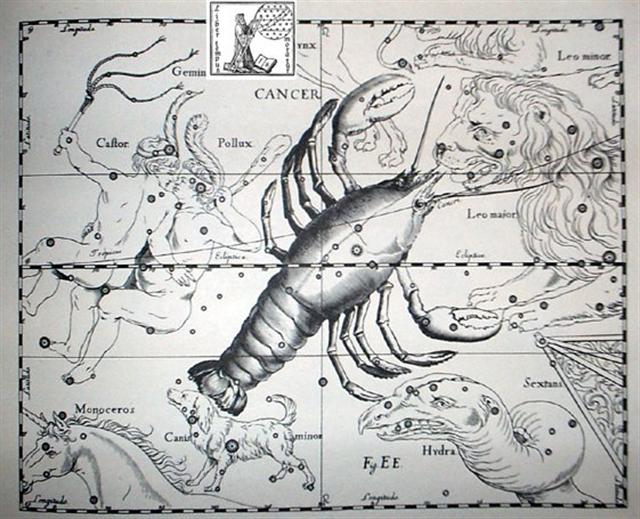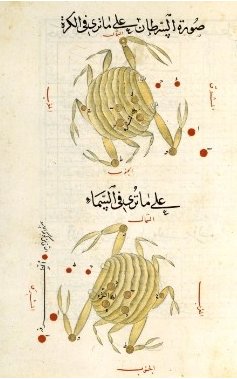The Lobster (Ura, Cancer) and the Lion looked at each other (not away from each other as the pair of contrasting Janus personalities):
... The eye is the symbolic site of subjection. Valeri observes that: 'The two sentiments that permit the transcendence of the self are, according to Hawaiians, desire and respect. One and the other are called kau ka maka, literally, 'to set one's eyes on' ... 'To see' (ike) in Hawaiian (as in French or English) is 'to understand', but it is also 'to know sexually'. Witness to the order, the world of forms generated by the chief, the eye, is the sacrifice of those who violate that order. The left eye of the slain tabu-transgressors is swallowed by Kahoali'i, ceremonial double of the king and living god of his sacrificial rites. Like the sun, chiefs of the highest tabus - those who are called 'gods', 'fire', 'heat', and 'raging blazes' - cannot be gazed directly upon without injury. The lowly commoner prostrates before them face to the ground, the position assumed by victims on the platforms of human sacrifice. Such a one is called makawela, 'burnt eyes'. Cancer and Leo have not been listed in the Chinese structure. But the Hindu had their 8th station as the Beehive (*128), at the top of the central shield of Cancer (the Lobster). *128 - *41 = *87 = day 167 ("June 16).
And as for Leo they had 3 nakshatra stations:
The Greek letters assigned by Bayer will tell us that the male Alfa bull was Regulus (the Little King in contrast to the Lucky King at the opposite side of the sky) with his female Beta (House) station at the end (tail, deneb) of life (deneb-ora); 217 - 191 = 26. Ora. 1. Healthy; to recover, to be saved (from an illness or a danger): ku-ora-á, ina kai mate, he recovered, he did not die; ku-ora-á te haoa, the wound has healed; e-ora-no-á, he is still alive; ora-hakaou mai, to come back to life; ora ké, what a pleasant breeze! (lit: how healthy!). 2. Stick for spinning top (made from the shell of a sandalwood nut) with which children make the top spin. Vanaga. 1. December, January. Ora nui, November, October. 2. To live, to exist, to draw breath, to survive, to subsist, to be well, healthy, safe, to refresh, a pause, rest, ease; e ko ora, incurable; ora tuhai, previous existence; ora iho, to resuscitate, to revive; ora nui, vigorous; oraga, life, existence; oraga roaroa, oraga roaroa ke, oraga ina kai mou, immortality; oraga kore, lifeless; oraga mau, oraga ihoiho, vivacious; oraora, oraora no iti, to be better; hakaora, to draw breath, to revive, to strengthen, healthy, to sanctify, to animate, to save, to repose, to cure, to rest, to comfort, to assuage; hakaora ina kai mou, to immortalize; hakaoratagata, Messiah, Saviour. 3. To give water to; kua ora te kevare, to water a horse; hakaunu ora, to water. 4. To staunch, to stop the flow of a liquid. 5. To make an escape; hakaora, to discharge, to deliver, to set free. 6. To be awake (probably ara); hakaora to guard. 7. A zephyr, light wind; kona ora, a breezy spot; ahau ora, agreeable breeze. Churchill. Ola, life, health, well-being, living, livelihood, means of support, salvation; alive, living; curable, spared, recovered, healed; to live; to spare, save, heal, grant life, survive, thrive. Ola loa, long life, longevity, Ola 'ana, life, existence. Wehewehe. The explorers reach Easter Island in a 'canoe' (vaka). The name of their craft is given as Oraorangaru 'saved from the billows' (Brown 1924:40) or Te Oraora-miro 'the living-wood' (ME:58). The Routledge reference 'Each (man went) on a piece of wood' (RM:278) also seems to refer to the name of the canoe. As far back as 1934, the name was no longer understood. I favor the following explanation: The difficulty in interpreting the name of the canoe of the explorers arises from the name segment oraora. To begin with, the compound form oraora ngaru should be analyzed in comparison with other Polynesian compounds, such as MAO. pare-ngaru 'that which fends off the waves' (i.e., the hull of the boat), TAH. tere-'aru 'that which moves through the waves' (i.e., riding the waves on a board). There are several possible translations for oraora as the reduplication of ora. Te Oraora Miro can be translated as 'the pieces of wood, tightly lashed together' (compare TAH. oraora 'to set close together, to fit parts of a canoe') and be taken to refer to the method of construction of the explorer canoe, while Oraora Ngaru means 'that which parts the water like a wedge', or 'that which saves (one) from the waves, that which is stronger than the waves'. (Barthel 2) The Central, and most important station of the 3, corresponded to the Fig Tree, with Adam on one side and Eve on the other:
From "June 16 (*87) at the heliacal Beehive (ε Cancri) to "July 10 (*111) at Regulus there were *24 right ascension nights.
The nose of the Lion (Al Minhar al Asad) marked the conjunction between Cancer and Leo, which at the time of the Bull had taken place (it could be deduced by extrapolating from the pace of the precession) in day 157 (= 314 /2) = JUNE 6:
Maitaki. Clean, neat, pure, pretty, nice, beautiful, handsome; tagata rima maitaki, clean-handed man, correct man. Vanaga. 1. Good. Henua maitaki = the good earth. 2. Shine. Marama maitaki = the shining moon. Barthel. Ce qui est bon. Jaussen according to Barthel. Meitaki, good, agreeable, efficacious, excellent, elegant, pious, valid, brilliant, security, to please, to approve (maitaki); ariga meitaki, handsome, of pleasant mien; mea meitaki ka rava, to deserve; meitaki ke, marvelous, better. Hakameitaki, to make good, to amend, to do good, to bless, to establish. Meitakihaga, goodness. PS Pau.: maitaki, good. Mgv.: meitetaki, beautiful, good. Mq.: meitai, good, agreeable, fit, wise, virtuous. Ta.: maitaiki, good, well. Niuē: mitaki, good. Maitakia, clean. Churchill.
Heu. Offspring of parents from two different tribes, person of mixed descent, e.g. father Miru, mother Tupahotu. Heuheu, body hair (except genitals and armpits). Vanaga. 1. Heheu; ivi heheu, the cachalot, bone needle; hakaheu, spade, to shovel, to grub up, to scratch the ground, to labor; rava hakaheu, laborious, toilsome. 2. Hakaheu, affair. Churchill. M. Heu, to separate, to pull asunder; the eaves of a house; heu, a single hair; hau, to hew; heru, to comb; huru, hair on the body; down; feathers; maheu, scattered; maheuheu, shrubs; mahuru, scrub; heuea, to be separated. Text Centre. Nonoma ran, he quickly went to Te Hikinga Heru (a ravine in the side of the crater Rano Kau) and looked around. There he saw the double canoe way out near the (offshore) islets, and the two (hulls of the canoe) were lashed together. |
||||||||||||||||||||||||||||||||||||||||||||||||||||||||||






